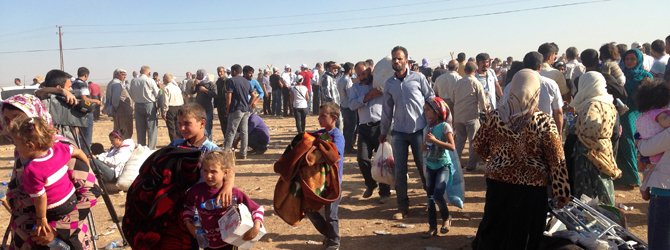-
Wither the WANA state? Some thoughts on protracted ...
Wither the WANA state? Some thoughts on protracted conflict in the WANA region

In Syria and Iraq, the monopoly on violence is no longer the prerogative of the state. The monopoly over the legitimate use of force is seen as one of the foundations of the modern state, as Max Weber argued in his seminal work, ‘Politics as Vocation.’ However, in Syria we are witnessing the proliferation of non-state actors challenging this concept, as they vie for control of different territories. These non-state actors include Al Nusra, Daesh (alternatively referred to as ISIS/ ISIL/ IS), the Free Syrian Army, Islamic Front and the NDF.
What does this multiplicity of groups want? And what does their proliferation mean for the future of the West Asia-North Africa (WANA) region? One useful lens for exploring these questions is political economy. Looking at groups’ economic interests is illuminating. I recently attended an insightful book launch for ‘The 'Islamic State' Organization: The Sunni Crisis and the Struggle of Global Jihadism’ (published by Friedrich-Ebert-Stiftung), which explores the development of Daesh. The authors discussed how it is impossible to understand the organisation by looking at ideology alone. Daesh are engaged in a number of activities, such as the exploitation of oil fields and the trading of antiquities, which can be seen as displaying pragmatism or an economic motive. How else do you understand the selling of oil back to the Assad regime and to other groups with whom Daesh are fighting? This is not to deny that there might be other motives, but to emphasise that ideology alone is not sufficient for explaining Daesh’s activities in Syria and Iraq. Incidentally, a political economy approach can also help us understand the ‘iron fist’ of oligarchy. The re-entrenchment of the military in politics in post-revolution Egypt is an example of this, whereby economic or de facto power was transferred to political power, or de jure power.
Another significant and related transformation we are witnessing in the WANA region is the erosion of borders. Daesh is determined to draw a new map of the Middle East. As much as governments and analysts discourage the use of the name ‘Islamic State,’ the organization is taking on state-like functions. Take for instance the recently unveiled Islamic State Heath Service and the carrying out municipal tasks in the towns and villages that it occupies. In Palmyra, Daesh provided services such repairing the power plant, opening the local bakery and distributing bread in combination with summary executions – appeasement with one hand and terror with the other. It goes without saying that Daesh’s aspirations for a “caliphate” pay no respect to current state borders.
The Syrian civil war is not restricted to Syria as it is territorially construed. Violence has spilled into neighbouring states, while regional actors are present inside Syria. The civil war has also resulted in large refugee flows; in Jordan alone there are more than 600,000 registered refugees and the Jordanian government puts the total estimation much higher. In traditional International Relations, refugee flows are seen as challenges to international order. This leads us to question the lens we use to view international politics. It might be better to view mass migration, which is a result of intensifying globalisation but also a response to worsening humanitarian crises such as Syria, as a feature of the current order, instead of a challenge to it. On the almost 100 year anniversary of Sykes Picot, when the region was divided up by foreign powers, the territorial integrity of the state should not be taken as a given.
What do these developments mean for the potential resolution of protracted and cyclical conflict in the region? Syrian peace talks have floundered. A key opposition group, the Syrian National Coalition, boycotted recent talks; more than ever questions about what makes a durable peace are important to consider. If there is a peace agreement forged it must take into consideration the diversity of the players in the Syrian conflict, while also addressing the economic interests of the various actors. In Syria, it is important to bear in mind that there are multiple war economies functioning simultaneously; it is not just rebel groups and militias that are reliant on them. According to a Carnegie report released this May, the Syrian regime is also invested. Disrupting war economies is not an easy task. Those benefitting from war economies have an economic interest in the prolonging of the conflict, thus a carrot and stick approach could be used to integrate them into a post-conflict order: rewards for those who participate and exclusion for those who do not. Additionally, as a number of regional actors are directly involved in the Syrian conflict, it’s likely that there needs to be a regional pact in order to build a durable peace.
These strategies are challenging to achieve, of course. The WANA Institute is making the right strides in contributing to building the regional knowledge base on conflict and transition in the region. Here in the Human Security team we are currently mapping the pre-conflict legal landscape in Syria in order to inform potential return scenarios. We are developing a pilot Conflict Resilience Index which will identify specific drivers of conflict in the WANA region, with the goal of contributing to more evidence based policy. We are also discussing how the region might go about making a “quantum leap” in the way it approaches refugee populations. These are small steps, but I believe they are steps in the right direction, towards enhanced resilience.

